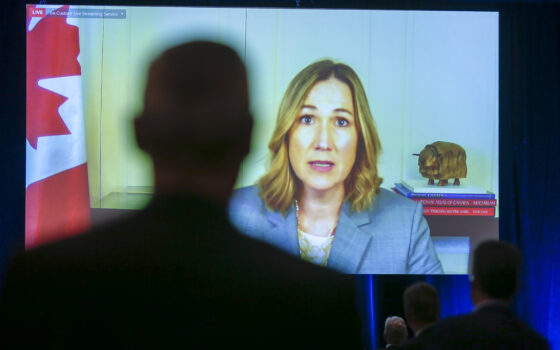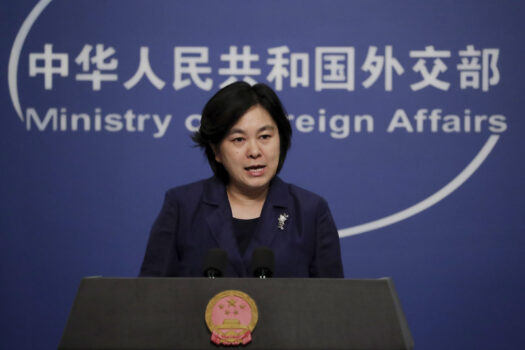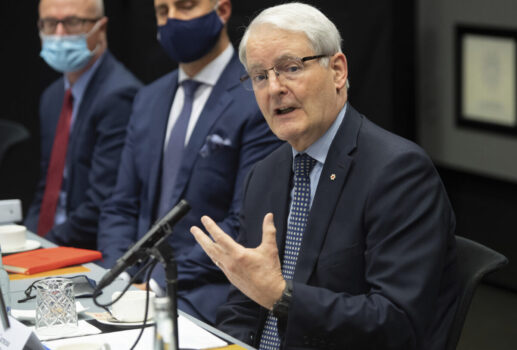The freeing of the “two Michaels” at the same time Meng Wanzhou was released from her bail conditions proves that Beijing was using hostage diplomacy all along and sets a troubling precedent for future dealings with the Chinese regime, warns Canadian Sen. Leo Housakos.
“[In] this particular case, China won. They got what they wanted,” Housakos told The Epoch Times. “They put pressure on us politically. They put pressure on our judicial systems.”
“My biggest fear is that this has emboldened the Chinese regime,” he added.
Housakos said that because the regime “got what they wanted” in the Meng case, they could use hostage diplomacy as an ongoing strategy in other situations that might arise.
“They could randomly pick up citizens of any one of our western democracies and hold them for ransom,” he said. “Nothing prevents them from doing it again.”

Canada’s ambassador to the U.S., Kirsten Hillman, has asserted that Washington did not make China’s release of the two Canadians, Michael Kovrig and Michael Spavor, a condition of the resolution of the charges against Meng.
During an interview on CTV’s Question Period on Sept. 26, she said Canada “never succumbed to the pressure” China asserted by detaining Kovrig and Spavor, and proved this by following through with Meng’s trial proceedings.
Meng, the CFO of Chinese telecom giant Huawei, was arrested in Vancouver on Dec. 1, 2018, on a U.S. extradition request related to fraud charges for allegedly misleading HSBC in 2013 about Huawei’s business dealings in Iran, in violation of U.S. sanctions. Days later on Dec. 10, Kovrig and Spavor were detained on baseless charges in China.
Under a deferred prosecution agreement with U.S. prosecutors signed on Sept. 24, Meng was allowed to plead not guilty but had to agree to the charges against her as spelled out in a statement of facts document. On the same day, a Canadian court removed her bail conditions, allowing her to fly back to China.
Also the same day, the two Michaels were released and allowed to fly home to Canada.
“Within minutes of Meng Wanzhou being freed they put the two Michaels on a plane,” Housakos said. “The Chinese regime did this in a blatant way, reinforcing that what they did was was hostage diplomacy.”
Beijing denies allegations it engaged in hostage diplomacy. Chinese foreign ministry spokesperson Chunying Hua insisted
during a press conference on Sept. 27 that the two Canadians were
released on bail for medical reasons, and that they have “confessed to
their crimes” of “endangering China’s national security.”

On Aug. 11, Spavor was found guilty on charges of espionage and sentenced to 11 years in prison by a Chinese court. Kovrig’s trial was held on March 21 but no verdict was announced.
Housakos notes that China’s judicial system is far from being independent and doesn’t try cases based on the rule of law, making it nearly impossible that the two Canadians would have received a fair trial—even if they were guilty as charged.
“We’ve seen when it comes to
detention of foreigners and Chinese themselves—anybody in China who the
regime and the Communist Party wants to detain—they detain them, they
try them secretly, they hold them without due process.”
‘Out-of-Control Tyrants’
Through the saga of the arbitrary detention of Kovrig and Spavor, “the Chinese communist regime’s thuggery has been fully exposed” and Canada must now distance itself from the regime, Housakos said in a statement issued on Sept. 25, where he proposed a “way forward” for Canada.
He stressed that Canada must act quickly and decisively to send a message that what happened would not be tolerated again.
“We must stand up to out-of-control
tyrants who so blatantly and proudly flout international rule of law. We
cannot allow others to suffer the same fate as Misters Kovrig and
Spavor and Mr. Huseyin Celil,” he wrote, referring to the Canadian Uyghur human rights activist who has been imprisoned in China since 2006.
“The communist regime of China is a very real and increasing threat. … Canada must start treating it as such.”
The senator proposed banning Huawei from Canada’s 5G, boycotting the Beijing Olympics, moving away from the reliance on cheap goods produced in China, and pursuing trade with countries that share the same values of “freedom, democracy, human rights, and rule of law.”
He told The Epoch Times that Canada cannot continue to trade with China until the regime “starts working within the confines of our values and principles.”
“To trade with China, in exchange for trading in our values of human rights and democracy, it’s just not worth it,” he said.
“Canadians can find cheap products from other sources for that matter. If need be, let’s start making some of those cheap products back in Canada.”

Meanwhile, Foreign Affairs Minister Marc Garneau said
on Sept. 26 that Canada’s “eyes are wide open” when it comes to
normalizing relations with China, and going forward will operate on a
fourfold approach of coexist, compete, co-operate, and challenge.
Housakos says Garneau may have his “eyes wide open” but still needs to “pull his head out of the sand” regarding Beijing’s threat to the world.
“This is a regime that really, really operates worse, I think, than any criminal organization or any nefarious type of dictatorial regime we have seen in a very, very, very long time,” he said.
“There is no limit to which they won’t go in order to achieve their goals.”
With files from Reuters
The Epoch Times.
Asia Nikkei: 'Hostage diplomacy' fears linger after China frees Canadians
Theepochtimes: Innocent Travellers Could be Pawns in Hostage Diplomacy
No comments:
Post a Comment